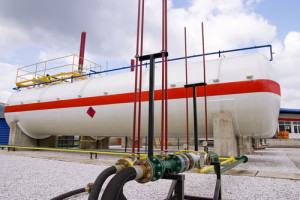US Natural Gas Exports Could Spur Manufacturing

The US must soon decide whether to allow unrestricted liquefied natural gas (LNG) exports to non-US markets, or to enact limits on natural gas exports to keep more ofthe fuel in the country. Vast reserves of natural gas in the US and newly developed extraction techniques have made it economically sensible to extract previously unviable deposits of natural gas. The gas can then be cooled in a liquefaction facility to -260 degrees Fahrenheit, when it condenses into liquid. At this point, the gas is basically pure methane, and burns much cleaner than oil or coal. Several studies have been conducted by economists and academics alike, all offering different outlooks on the effect of LNG exports to the American GDP. All agree on one thing; LNG has the potential to stimulate American manufacturing, kick off a thriving energy export industry, and contribute to North American energy independence. But there are disagreements over whether there should be any limits or regulation on the volume of LNG the US can export.
While the US has historically been a net importer of natural gas, there are a handful of LNG facilities currently awaiting federal approval for exports. Only one hasbeen cleared so far, and no other liquefaction facilities exist in the lower 48 states. All LNG that the US currently produces comes from a terminal in Alaska. Recently, BP signed a 20 year contract to ship LNG from a terminal in Freeport, Texas, which should begin in 2017 with the completion of facility construction. The approved facility will be located in Cameron Parish, Louisiana, and is slated to export about 400,000 tons/year of LNG to Tokyo Electric Power Co in Japan. Japan is currently the largest Asian market for LNG.
There is a major concern among some American economists and manufacturers that natural gas exports will cause American fuel prices to rise and, as a result, cause American product prices to rise as well. For example, Purdue University released a comparison of studies on economic impacts of natural gas exports that supports keeping LNG in the United States. Purdue’s economic model showed a small negative impact on the US GDP if natural gas exports were not restricted. While the impact was small, the study explains that;
It is clear that policy makers need to be very careful in approving US natural gas exports. While we are normally disciples of the free trade orthodoxy, one must examine the evidence in each case. We have done that, and the analysis shows that this case is different. Using the natural gas in the US is more advantageous than exports, both economically and environmentally.
Senate Energy and Natural Resources Committee Chairman Ron Wyden, D-Ore, is cautious about the effect unrestricted LNG exports will have on the US economy. He suggests that the solution will be to find a “sweet spot where U.S. gas producers make enough money to continue producing and U.S. manufacturers have an affordable stable supply of natural gas.” A stable domestic supply of natural gas is crucial for American business and manufacturing. Domestic fuel will keep energy prices low and American products competitive.
In the wake of President Obama’s promise to combat climate change in his State of the Union Address, LNG will gain more attention from lawmakers and the public going forward. Natural gas is a fossil fuel and the practices of extracting it via hydraulic fracturing, or “fracking,” and horizontal drilling have gained criticisms from environmental groups, but natural gas is a much cleaner burning fuel than oil or coal. Several power plants have already converted to natural gas for fuel, and more are planned.
A transition to natural gas may be a more climate-friendly option while the world seeks sustainable energy sources. President Obama declared in his State of the Union speech last week , “The natural gas boom has led to cleaner power and greater energy independence. We need to encourage that.” He also pledged to help “cut red tape” that hinders the development of natural gas and oil resources. Hopefully, this will mark a step forward in America’s quest for energy independence.
Read More – http://theenergycollective.com/ecsjessica/187771/us-lng-exports-will-spur-manufacturing-momentum
US Natural Gas Exports Could Spur Manufacturing
